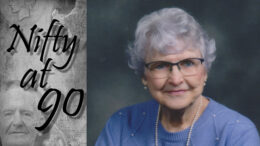From PennWest-Clarion
For more than six decades Venango Campus has served the local community by providing residents the opportunity to earn secondary education degrees.
In turn, that not only helped to keep some of those graduates in the area as they furthered their education, but many would go on to land jobs here and help keep the local economy churning.
When it began
The concept of Venango Campus began in 1960, when community leaders saw the need for a higher education presence in Venango County and advocated for the creation of what was to become the branch campus of Clarion State College, which later became Clarion University of Pennsylvania and finally PennWest-Clarion.
Through the years, the community raised funds for land, buildings and scholarships, and maneuvered through bureaucracy and legalities to build the first regional campus in Pennsylvania’s State System of Higher Education.
Partnerships joined with others in the fields of health care, industry, business and education to enhance and expand programs, extend outreach, share resources and meet the changing needs of the state and its workforce.
The Pennsylvania superintendent of public instruction then approved a request by Clarion State College to establish Venango Campus in Oil City in April 1961.
Speaking in Oil City shortly after his inauguration, President James Gemmell, Clarion’s 11th president, said, “Venango Campus is a combination of the best features of private contributions with public support. Such a partnership of private and public financing is in the best traditions of a free society and sets a pattern for other communities to follow.”
Community effort
The community raised the $350,000 needed to acquire land for the campus and to construct its first building — $382,000 was pledged from nearly 1,800 individuals, clubs and organizations.
As the campus numbers started to grow, so did the number of buildings. On June 25, 1965, groundbreaking ceremonies were held for a Venango Campus dormitory, located near the western end of the parking lot.
There was, however, a hurdle to clear in Venango becoming a formal branch campus.
The state had not accepted the title to the real estate, so Venango Campus remained in private ownership of Venango Campus Inc., and was thus ineligible for state funds for expansion as a branch campus of Clarion State College. Moreover, the commonwealth hadn’t committed to consideration of it as a branch campus.
In April 1961, Gemmell received a letter from the superintendent of the Pennsylvania Department of Public Instruction that read: “In accordance with advice from the attorney general, I hereby give my approval for Clarion State College to establish an off-campus center in Oil City, Pa.”
But in 1967, the state was taking a second look at branch campuses. The Council of Higher Education had commissioned a study that recommended colleges divest themselves of branch campuses and that those campuses become community colleges. Until the study was completed, the state refused to accept the transfer of the property.
Eventually, on March 13, 1970, state Sen. Richard Frame and Assemblyman Alvin Kahle, who also had been a Venango County commissioner, presented the deed to Venango Campus to the state for recording at the Venango County Courthouse.
Programs
Throughout its history, Venango Campus has gone through many changes in programs.
In June 1968, the state approved an associate degree in nursing program, added under a special exemption from a state rule that allowed only community colleges to grant associate degrees.
In fall 1974, the campus launched a two-year program in business administration to prepare students for supervisory positions in business offices. Because only community colleges were allowed to offer associate degrees, students received a letter of attainment upon successful completion of the program. They could, however, continue at the Clarion campus for two additional years and earn a bachelor’s degree in business administration.
In February 2005, a news conference was held at Venango Campus to announce a groundbreaking cooperative venture with FirstEnergy Corp., the parent company of Penelec, to offer a concentration in electric utility technology within the new associate of applied science in industrial technology degree.
In recent years, programming continued to focus on the regional workforce and its needs.
Partnerships
Another key component for Venango Campus was through the $1.1 million Appalachian Regional Commission (ARC) grant, which included partnerships between Venango Campus, Venango Technology Center, Keystone Education Council, Community College of Allegheny County, and the Strategic Early Warning Network.
The partners worked together to train and pull resources to administer programs and initiatives, such as certificate programs in welding, entrepreneurship opportunities with small business and veterans’ Jump Start programs, pre-apprenticeship and apprenticeship programs for machine setters and welders, and, where appropriate, stacking credentials into a degree in applied technology.
A convenience in attending Venango Campus was that it gave students a safe and smaller option to try college. It provided personalized supports, experience and a small environment to enable students to achieve success.
The campus traditionally focused on programs of two years or fewer with a broad array to address the region’s workforce needs. Additionally, a focus on partnerships provided an avenue for technical education programs that typically were not found on traditional larger campuses.
The campus also has served as an incubator for new programs, which expanded and transitioned to the main campus.
What’s ahead
An agreement of ownership transfer from Pennsylvania’s State System of Higher Education to the ORA has been authorized by PASSHE’s Board of Governors, according to ORA Executive Vice President Debbie Sobina.
The commonwealth’s Department of General Services will draft language on the transfer and send it to the state Legislature for approval, Sobina said. If the Legislture were to deny the ownership transfer, PASSHE has the authority to lease the property.
In either case, according to Sobina, the ORA will take occupancy on July 1.
In a January news release, the ORA said its intended use of the property is to further the nonprofit’s mission of heritage preservation, economic development, recreation, tourism and arts revitalization.
At that time, ORA President and Chief Executive Officer John R. Phillips II told the newspaper that the ORA would maintain the property as an “educational entity,” and Sobina said it would serve as a “multipurpose campus” and that mission would be “an undertaking with the community.”
To that end, Sobina said Thursday, the ORA is close to finalizing a deal with an “anchored and credentialed” educational entity to lease part of the space on campus.
In addition, the ORA would host job-training programs at Venango Campus and continue to support the Venango Conservation Hall of Fame established in Rhoades Center, according to the ORA’s January release.
“We’re extremely excited to see what’s next in the evolution of Venango Campus,” Phillips said Thursday.
































